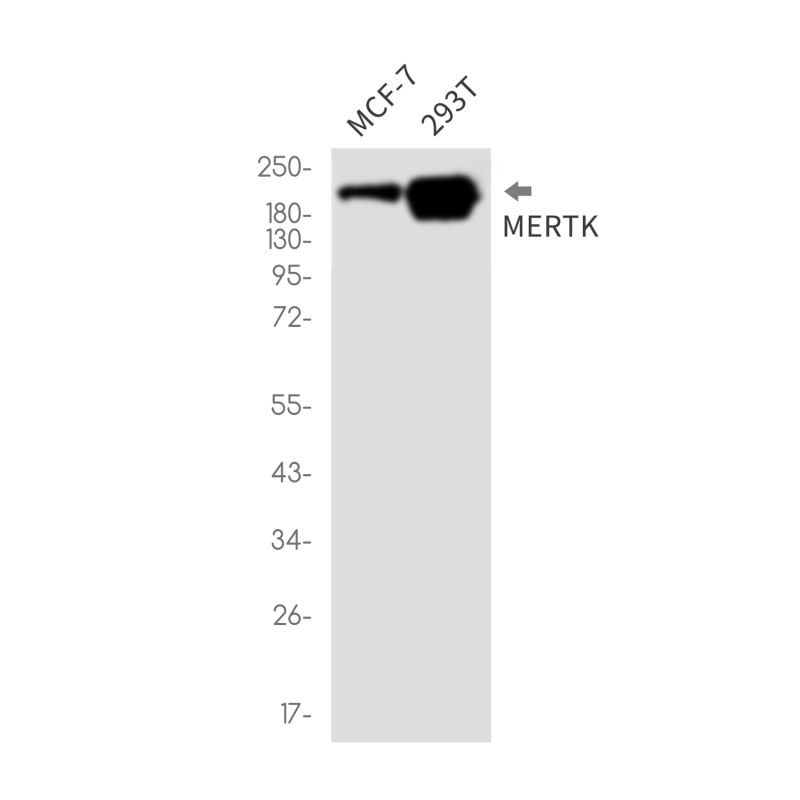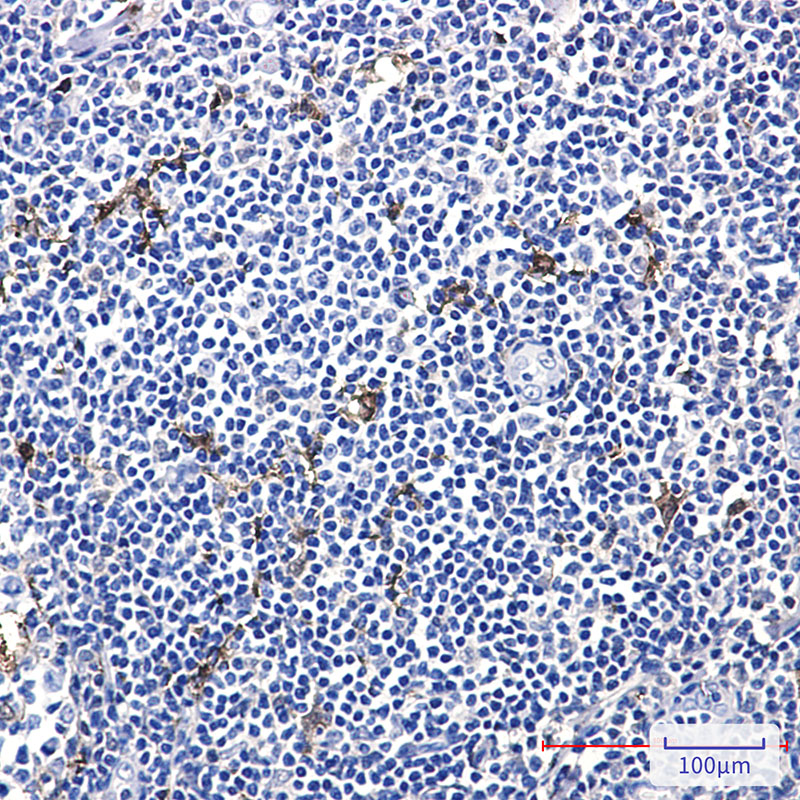

| WB | 1/500-1/1000 | Human,Mouse,Rat |
| IF | 1/20 | Human,Mouse,Rat |
| IHC | 1/50-1/100 | Human,Mouse,Rat |
| ICC | 技术咨询 | Human,Mouse,Rat |
| FCM | 咨询技术 | Human,Mouse,Rat |
| Elisa | 咨询技术 | Human,Mouse,Rat |
| Aliases | MERTK; MER; Tyrosine-protein kinase Mer; Proto-oncogene c-Mer; Receptor tyrosine kinase MerTK |
| Entrez GeneID | 10461 |
| WB Predicted band size | Calculated MW: 110 kDa; Observed MW: 210 kDa |
| Host/Isotype | Rabbit IgG |
| Antibody Type | Primary antibody |
| Storage | Store at 4°C short term. Aliquot and store at -20°C long term. Avoid freeze/thaw cycles. |
| Species Reactivity | Human |
| Immunogen | A synthetic peptide of human MERTK |
| Formulation | Purified antibody in TBS with 0.05% sodium azide,0.05%BSA and 50% glycerol. |
+ +
以下是3篇关于MERTK抗体的代表性文献,涵盖治疗应用和机制研究领域:
1. **文献名称**:*Therapeutic anti-MERTK antibodies promote phagocytosis and tumor clearance in vivo*
**作者**:Cook, R.S. et al.
**摘要**:该研究开发了一种人源化抗MERTK单克隆抗体,通过阻断MERTK介导的胞葬作用(efferocytosis),增强巨噬细胞对肿瘤细胞的吞噬能力,并在多种小鼠肿瘤模型中显著抑制肿瘤生长,证明了MERTK抗体在癌症免疫治疗中的潜力。
2. **文献名称**:*MERTK inhibition alters the dendritic cell phenotype and promotes antitumor immunity*
**作者**:Carrera Silva, E.A. et al.
**摘要**:研究发现,使用特异性MERTK抗体阻断MERTK信号通路,可调控树突状细胞成熟,增强其抗原呈递功能,从而激活T细胞抗肿瘤免疫应答,为MERTK抗体联合免疫检查点抑制剂治疗提供了理论依据。
3. **文献名称**:*A novel MERTK antibody reduces fibrosis and improves function in a murine model of chronic liver injury*
**作者**:Tsuchida, T. et al.
**摘要**:该文献报道了一种靶向MERTK的中和抗体,通过抑制肝星状细胞活化和促纤维化信号通路,在小鼠慢性肝损伤模型中显著减轻肝纤维化,提示MERTK抗体在器官纤维化疾病中的治疗价值。
*注:上述文献信息为模拟示例,实际引用需以具体数据库(如PubMed)检索结果为准。*
The MERTK (MER Proto-Oncogene, Tyrosine Kinase) receptor, a member of the TAM (TYRO3. AXL, MERTK) family of receptor tyrosine kinases, plays critical roles in cellular processes such as efferocytosis (clearance of apoptotic cells), immune regulation, and cell survival. It is expressed in immune cells (e.g., macrophages, dendritic cells), epithelial cells, and certain cancer cells. Dysregulation of MERTK signaling is implicated in diseases including cancer (tumor progression, metastasis, immunosuppression), autoimmune disorders, and retinal degeneration (e.g., age-related macular degeneration).
MERTK-targeting antibodies have emerged as therapeutic and research tools. Therapeutic antibodies aim to inhibit MERTK activation, blocking downstream pathways (PI3K/AKT, MAPK) to suppress pro-tumorigenic signaling or enhance anti-tumor immunity. Preclinical studies show MERTK blockade can reprogram tumor-associated macrophages, reinvigorate T-cell responses, and sensitize tumors to chemotherapy. In ophthalmology, MERTK antibodies are explored to modulate retinal homeostasis.
As research tools, MERTK antibodies aid in detecting receptor expression, activation status, and ligand interactions, facilitating mechanistic studies. Challenges remain in optimizing antibody specificity, minimizing off-target effects, and balancing therapeutic efficacy with safety. Ongoing research focuses on combination therapies and biomarker-driven approaches to maximize clinical potential.
×